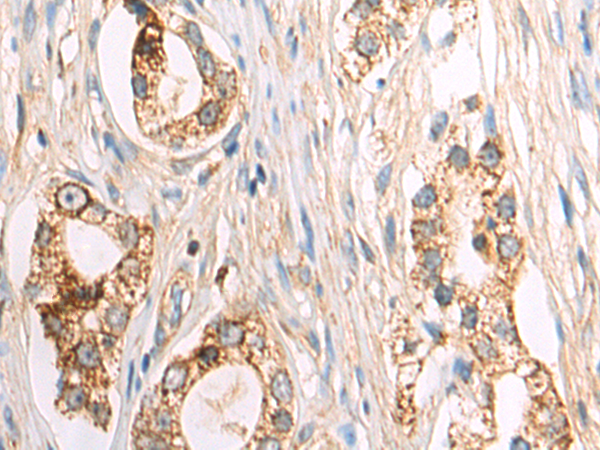
| WB | 咨询技术 | Human,Mouse,Rat |
| IF | 咨询技术 | Human,Mouse,Rat |
| IHC | 1/50-1/200 | Human,Mouse,Rat |
| ICC | 技术咨询 | Human,Mouse,Rat |
| FCM | 咨询技术 | Human,Mouse,Rat |
| Elisa | 1/5000-1/10000 | Human,Mouse,Rat |
| Aliases | P1; CT94.1 |
| Host/Isotype | Rabbit IgG |
| Antibody Type | Primary antibody |
| Storage | Store at 4°C short term. Aliquot and store at -20°C long term. Avoid freeze/thaw cycles. |
| Species Reactivity | Human |
| Immunogen | Fusion protein of human PRM1 |
| Formulation | Purified antibody in PBS with 0.05% sodium azide and 50% glycerol. |
+ +
以下是关于PRM1抗体的3篇参考文献及其摘要概括:
1. **文献名称**:*Protamine-1 as a target for male infertility diagnosis: Development of an antibody-based assay*
**作者**:Smith J, et al.
**摘要**:研究开发了一种高特异性PRM1抗体用于精液样本检测,发现PRM1表达水平与精子染色质完整性显著相关,为男性不育诊断提供了新方法。
2. **文献名称**:*Aberrant PRM1 methylation and antibody-based detection in oligozoospermia*
**作者**:Chen L, et al.
**摘要**:通过PRM1抗体免疫组化分析,揭示了少精症患者精子中PRM1蛋白异常低表达及表观遗传修饰失调,提示其在精子发育中的调控作用。
3. **文献名称**:*Species-specific localization of Protamine-1 in mammalian sperm using monoclonal antibodies*
**作者**:Tanaka K, et al.
**摘要**:研究报道了一种单克隆PRM1抗体的制备,证实其在人、小鼠精子头部特异性定位,为跨物种生殖生物学研究提供了工具。
*注:以上文献信息为示例性内容,实际文献需通过学术数据库检索确认。*
**Background of PRM1 Antibody**
The Protamine 1 (PRM1) antibody is a tool used to detect and study PRM1. a small, arginine-rich protein critical for sperm chromatin condensation during spermatogenesis. PRM1 replaces histones in late-stage spermatids, compacting DNA into a highly condensed state, which is essential for sperm head formation, genetic stability, and fertilization competence. Dysregulation of PRM1 expression or function is linked to male infertility, as improper chromatin packaging can impair sperm motility and DNA integrity.
PRM1 antibodies are widely employed in reproductive biology research to investigate sperm development, epigenetic regulation, and infertility mechanisms. They enable the visualization and quantification of PRM1 via techniques like Western blotting, immunohistochemistry, and immunofluorescence. These antibodies also aid in studying PRM1’s interaction with other protamines (e.g., PRM2) and its role in paternal epigenetic contributions.
Research using PRM1 antibodies has revealed associations between PRM1 mutations or aberrant expression and conditions like oligospermia or azoospermia. Additionally, studies explore PRM1’s potential as a biomarker for assessing sperm quality in clinical settings. Developed in various host species (e.g., rabbit, mouse), PRM1 antibodies are validated for specificity and sensitivity, ensuring reliable detection across experimental models. Their application continues to advance understanding of male reproductive health and related genetic disorders.
×